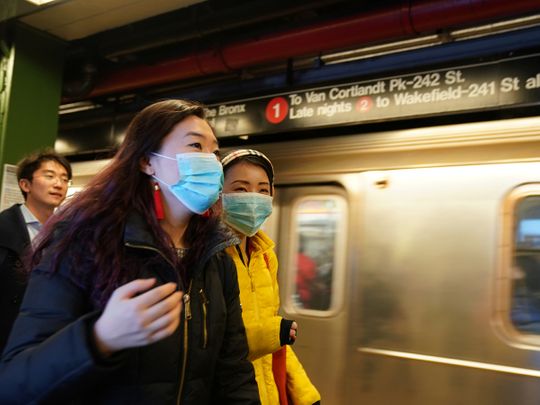
New York: The manager of a hotel near Newark Liberty International Airport in New Jersey that relies on tourists from China estimated the loss from the coronavirus outbreak at “well over $100,000 (Dh367,000) and climbing.”
A company that arranges Chinese-language bus tours of the sights in Manhattan is dealing with as many as 300 cancellations from Chinese tourists who cannot come to New York this week.
The owner of a travel agency in Queens who had booked trips for 200 Chinese tourists this week and next has already thought about when he might have to lay off two of his five employees.
With health officials scrambling to deal with an outbreak that is spreading around the world, tour operators and travel agents in the New York area are bracing for the economic pain that will come with empty rooms in hotels and empty seats on tour buses.
“It’s going to be a serious financial burden,” said Elizabeth Chin, a travel agent in Fort Lee, New Jersey, and chairwoman of the Pacific Asia Travel Association, a trade group. “The flights are canceled. The tour operators have canceled.”
Across the globe, many cities are starting to experience the fallout from the precipitous drop of visitors from China now that the Chinese government has imposed a ban on organized tours and many airlines have suspended service to and from that country. The coronavirus is believed to have originated in Wuhan, China, late last year.
Health officials in New York have identified three possible cases of the virus among residents, all of whom are now hospitalized. The official said the city was prepared for the possible spread of the virus and cautioned people not to panic.
Still, beyond a plunge in Chinese visitors, owners of restaurants and stores in New York’s three main Chinatowns say the coronavirus and the fears it has stoked are hurting business.
At restaurants in Chinatown in Manhattan, workers and owners said business had dropped 50 per cent to 70 per cent in the last 10 days.
In New York City, China is an important source of visitors. Chinese tourists represent the second-largest group of foreign travelers. (Visitors from Britain are No. 1.)
Bruce Zhu, manager of China Tour Travel Services in Flushing, Queens, had booked hotel rooms and made sightseeing-tour arrangements for 200 people who were scheduled to arrive from China in the next two weeks. He said that was a typical number for early to mid-February.
“It’s a big problem,” he said. “We have to cancel the bookings, cancel the hotels. We lose a lot of money on the bookings.”
He said he might have to lay off two of his five employees, the two who work in the office full time. (The other three work from home as needed, he said.)
He said he would decide whether to cut back in about a month. “If there’s good news, they’ll continue,” he said. “If the news is no good, not.”
Another travel agent in Flushing, Lijun Yang, said his company would typically arrange for one tour bus a day to Manhattan. He said five or six buses from operators that cater to Chinese tourists usually pick up tourists on the way to Manhattan and sometimes converge at the same places.
“If you stand at the bull on Wall Street,” he said, referring to the Charging Bull statue in Bowling Green, “you could see, through the course of the day, three or four of groups people arriving at the same time, 100 to 150 people.”
“It’s all stopped - zero,” he said. “No Times Square, no Empire State Building, no Metropolitan Museum, no Wall Street, no United Nations.”
Hotels near Yang’s office are also feeling the pinch. More than half of the 160 guest rooms at the John Hotel in Flushing were empty over the weekend, said the clerk at the front desk, Amy Ong. Around the corner, the manager of the Best Western Queens Court said cancellations and no-shows had begun before travel restrictions took effect, reducing business 25 per cent in the last two weeks of January.
A hotel popular with Chinese tour operators and travel agents, the Wyndham Garden Newark Airport, is likely to lose $250,000 to $300,000 worth of business in the next 90 days, said the general manager, Dwayne Cronce. He said he was already facing a loss of well over $100,000 from cancellations and no-shows.
“It hurt us immensely in the last three weeks, and it’s probably foreseen to be that way for the next couple of months,” he said. “Like everything else, it will work itself out, but the initial impact? Very difficult.”












